Part 1: Metropolitan Isaiah of Tamassos, on All Aspects of the Ukrainian Question
His Eminence Metropolitan Isaiah of Tamassos and Orinis gave an interview to the Romfea Church news agency, which we have translated into English in three parts, frankly answering all the questions about his position regarding the actions of Constantinople, the West, and Moscow, and also commenting on the behavior of the Archbishop of Cyprus. In the end, Metropolitan Isaiah answered how, in his view, a resolution to the “Ukrainian question” could be reached.
—Why then do you not agree with the West supporting the schismatic OCU and therefore you disagree with the Ecumenical Patriarchate?
—My only objection and disagreement with this policy of the West is that we have mixed the history and theology of the Orthodox Church with the foreign policy of states, resulting in a serious threat to the future of Orthodox unity.
As you know, there is no friendship in international diplomacy, where interests and advantages prevail.
However, in the Church, we always follow the path of the Gospel truth, the sacred canons, and the Sacred Tradition, despite the fact that this sometimes leads us into conflict with our government, as often happens in the field of state legislation.
The selective and discriminatory attitude of the West, as well as the “deafening silence” and disregard for the religious rights of thirteen million Ukrainian Orthodox who don’t want to break their relationship with their Mother Church (which is what they consider the Russian Church to be), the blatant indifference for the absurd behavior of the self-proclaimed “Patriarch of Kiev” Philaret, who has created his own “church” again and today calls the Ecumenical Patriarch a “traitor,” as well as the recent dangerous statements from the “Metropolitan of Kiev” Epiphany, recognized by the Ecumenical Patriarchate, are cause for extreme concern.
Epiphany claims that his schismatic structure is recognized by all the Churches that are in countries belonging to the Western sphere of influence or claim good relations and an alliance with the West.
How could this happen? The Synods of the Local Churches will be divided into two camps: the “Russophobes” and the “supporters of the Ecumenical Patriarchate;” and thus, as a result of this “divide and conquer” policy, carried out through political pressure, everyone will, in the end, recognize the schismatic OCU.
All these statements, hints, and initiatives foretell tragic events for the unity of the Orthodox Church in the coming years.
As for the Ecumenical Patriarchate, in my heart I wouldn’t like to believe that its goal is division, but I think in its attempts to oppose the Russians, it unites with people who have other interests.
On the other hand, I’m certain that Epiphany “of Kiev,” who now aims for the status of Patriarch, is using this situation for his own selfish purposes.
In the face of this danger of division, every member of the Orthodox Church, regardless of the political and geostrategic interests of his country, should remember that we are, first of all, Orthodox Christians.
Ethnophyletism, which was declared a heresy in council, is strongly promoted for political purposes by some non-ecclesiastical governing centers.
In the face of these intersecting international interests, it must be borne in mind that the decision about the autocephaly of the Orthodox Churches of independent states should be made not by one Local Church, but by a pan-Orthodox council.
The Orthodox Church that desires to obtain autocephalous status, according to the existing procedure, submits a request for the granting of autocephaly to its Mother Church; and this decision must be approved by all the other Local Churches. After that, the Ecumenical Patriarchate, having received the authority from the Council of Orthodox Churches, on the basis of the privileges it has as the first-ranked Church among the equal Local Churches, undertakes to implement this decision.
The Ecumenical Patriarchate believes it is right in the Ukrainian issue despite the fact that its decisions were in the hands of the Western world.
—That all sounds very logical, but what do you say about the historical rights of the Ecumenical Patriarchate as the first in rank in Orthodoxy? Does not his leadership role allow him to coordinate, with the appropriate responsibility, all the Orthodox Churches?
—The primacy of the Ecumenical Patriarchate, which we all honor and respect, is a primacy of service, not power.
Consequently, it has no authority over other Churches, but serves them, by coordinating their interaction, thanks to the great role it undoubtedly plays in the history and theology of the Orthodox Church.
The things we hear about the “first without equals” worries us, and I hope it’s just a private academic approach misinterpreted from a theological point of view, and not a belief in their unlimited authority.
In this struggle for the resolution of geopolitical and ecclesial problems, we must remember what spiritually and historically unites us with the Slavs.
We mustn’t forget our common spiritual history and our cultural ties with the Slavic Orthodox countries.
We also mustn’t forget the fact that the Moscow Patriarchate was nearly destroyed by the Soviet authorities, and today we have hundreds of thousands of Russian New Martyrs who are revered by all of Orthodoxy.
In fact, the martyred Russian Church, which had no mechanisms for achieving the political and military goals attributed to it, never posed a real threat to the rest of the Local Orthodox Churches.
On the contrary, it contributed to their spiritual strengthening, thanks to the myriad of saints, venerable monastics, ascetics, theologians, and martyrs.
Some might say that the history of the Church is one thing, and the policies pursued by its governing bodies is quite another. On the one hand, I agree with this assertion, but on the other hand, the ruling structures are representatives of their peoples, so we should look for ways to cooperate with them, not separate from them.
The thirteen million Orthodox of the independent and autonomous Ukrainian Orthodox Church headed by Metropolitan Onuphry, the 110 bishops, 250 monasteries, 5,000 monks, and the dozens of ecclesiastical educational institutions of this Local Church are a testimony to the significant Slavic religious and historical heritage that was grafted onto the Byzantine root, and also fell victim to the brutality of the former Soviet regime. And if that weren’t enough, today they suffer from the violent actions of “Orthodox nationalists,” who intend to subjugate them.
It should be noted that our reaction to the Ukrainian problem expresses our respect for Slavic Orthodox history and traditions and our desire to continue the fraternal relations and cooperation between our Local Churches. Of course, the Moscow Patriarchate should learn from the mistakes of the past, as should we.
Speaking theologically, we believe that in the Ukrainian question, none of the conditions for granting autocephaly were met, as described in detail in the recently published book of the Metropolitan of Kykkos and abbot of my monastery, His Eminence Nikiforos, which explains our reaction to the OCU.
Our objections are not directed against the Ecumenical Patriarch personally. We also don’t want to come out against any policy, be it Western or of any other democratic country that desires peace in the whole world, fairly and impartially observes the laws of morality, and respects the religious traditions of the Local Churches.
The autocephaly and independence of the Local Orthodox Churches are based precisely on the observance of the rules of the conciliar structure of universal Orthodoxy, and whoever violates this balance for any reason automatically violates our freedom of religion and the unity of our Churches. This is stated by the Orthodox Churches that still refuse to recognize the schismatic OCU.
It was for the sake of this freedom of religion and unity that we, the Cypriot Church, made the deliberate decision to remain neutral in this matter.
Through our neutrality, we wanted to give the body of the Orthodox Church the chance to gather to make a final decision and thus save our freedom and the unity between our Churches from political influence.
All this is stated in our Holy Synod’s decision (2/28/19), which clearly spoke about the observance of a “creative neutrality” on this matter.
—There have been accusations against you saying that the neutral position you support actually plays into the hands of the Moscow Patriarchate. How would you respond to this?
—Sometimes there are accusations that our neutrality in this matter is because of the influence of the Russian Church over us. And some of our actions, which have no relation to this matter, are maliciously used as arguments against us: that we built a church in the Slavic architectural tradition for the Russian-speaking inhabitants of Cyprus, or that we were vested in a Russian-style mantia and kukol at the consecration of a church one time (as if the Orthodox tradition of any people is a crime), or that we take care of our Russian-speaking flock and allow them to finance their religious and cultural activities.
Everyone well knows that the rich Russian immigrants who have acquired citizenship in Cyprus sometimes financially support their religious culture on the island through various events. They, of course, don’t give us money directly and support only these projects. The projects are not supported by our funds.
The rich Americans, Europeans, and Greeks living abroad do the exact same thing, don’t they? But no one has ever accused anyone of “maliciously” financing churches and other Church institutions, or that American dollars and euros influence the Church in religious or other terms.
As for immigrants, everyone on the international level says that we must respect their background, religion, and culture. But recently, when it comes to the Russian Orthodox, there’s a “fashion” of prejudice towards them and of forgetting about their human rights. Cyprus, as a crossroads of religions and cultures, has always had a tradition of respect for all its inhabitants, regardless of race, skin color, or religion. We want this to continue.
The only one who actually received any money (a “good sum,” as he said about me) for his own projects, churches, and other Church needs in Cyprus that have nothing to do with the Russian-speaking community is His Beatitude Archbishop Chrysostomos of Cyprus. He acknowledged this in recent interviews, which you can easily find.
I believe that we cannot afford, either as a Local Church or a state, to risk our spiritual and political freedom and independence by upsetting the international or religious balance.
If this happens, then one day we will wake up and realize that we are alone in this world, where there are no friends, but only interested parties, who, using you, leave you in a snare of solitude, in a painful and harsh reality.
But if we defend our moral principles and values without fanaticism, egotism, or bias, then we will eventually earn the respect and gratitude of the people.
Interests often change, and the reputation, respect, and dignity of a Local Church, state, or person who has made a wrong move can disappear in an instant.
This is why we must be careful, fair, and open to cooperation with everyone, thinking not just about today, but also about tomorrow.
As those who treat addictions say, the best treatment for addiction is prevention. Once an addiction develops, it’s too late.
—Your Eminence, listening to all of this, we can conclude that you have a problem with the decisions of the Ecumenical Patriarchate. How will you relate to such a policy in the future? Will you start opposing the Ecumenical Patriarchate? Won’t this undermine the Orthodox unity that you want to protect?
—For me, the Ecumenical Patriarchate is the cradle of our Byzantine culture and the embodiment of the fascinating soul of the Greek people—a people, who, despite all the difficulties and unfavorable conditions, managed to survive and continue to value our unshakeable Orthodox cultural tradition in all corners of the globe.
The Ecumenical Patriarch has always been the Patriarch of all the Romans and the spiritual father of the Orthodox martyrs of my beloved Constantinople.
It is he who inherited the heavy burden of spiritual pastoral care for the Greek-Romans abroad.
For me, the Ecumenical Patriarchate is one of the most sacred Orthodox institutions, the sacred ark of theology and Byzantine culture.
All these feelings were deeply implanted in my heart by my spiritual father, Metropolitan Nikiforos of Kykkos, who told me about Romanity and regularly took me with him to Constantinople and Asia Minor.
My views were solidified through my studies and pilgrimages to Constantinople and Cappadocia, when I was already a bishop.
The love I have in my heart for the Ecumenical Patriarchate was strengthened every time I asked a blessing from our Patriarch Bartholomew, who fights for the future of our martyred people, and it grew more and more thanks to the fraternal and pastoral cooperation with the bishops of the Ecumenical Throne.
We will never take any steps that will intentionally harm the Ecumenical Patriarch; but we won’t be silent in those issues where, in our opinion, something is not right.
—Yes, but the Archbishop of Cyprus publicly accused you of receiving money from the Russians (indirectly, but in a way that everyone understood) and declared that this was the reason for your negative attitude to the Ecumenical Patriarchate. What do you say to this?
—Is it really fair to consider as enemies those who have such fervent love and respect for the Ecumenical Patriarchate, as I mentioned above, because of some disagreements on the Ukrainian issue, and attribute foreign interests to us because we expressed a different point of view?
How can some people dare, following their own interests, to poison our sacred relations with the Phanar?
For me, this is criminal and blasphemous. To speak the truth does not mean to go against the Ecumenical Patriarchate. If you love someone, you speak with him sincerely.
The same can also be said about my spiritual father, Metropolitan Nikiforos of Kykkos: We love and support the Ecumenical Patriarchate, and as far as our strength allows, we will always stand guard over its historical and spiritual privileges of being the first among the equal Orthodox Patriarchates.
If we don’t agree with the Ecumenical Patriarchate, it doesn’t mean we’re against it. On the contrary, it means we love and value it, and want to express constructive criticism in truth so it might be able to withstand great temptations.
Unfortunately, in the name of his petty interests in Cyprus, our primate shamelessly accuses us, saying that supposedly our reaction is because of Russian money (I say this with great pain). It’s completely unacceptable!
I already answered you before about Russian money.
It’s doubtful that any money is even needed by Kykkos Monastery, which, as my geronda said, didn’t even receive an icon from them [the Russians]. If the Kykkos Monastery hadn’t helped me maintain the Russian church and its territory, we wouldn’t even have been able to hire a sacristan. Since 1993, the monastery has spent tens of thousands of euros a year to support Greek language courses in Russia. In difficult times, we, the Kykkos Monastery, have given material and moral support to both the Ecumenical and the Moscow Patriarchates.
The most painful blows are always dealt by your own, native people, as it says in one of our songs: “If a relative hits you in the eye, you’ll always be lopsided.” This is what happened with us and the Archbishop, who made erroneous conclusions and raised the Ecumenical Patriarch up against us—and also insulted Patriarch Kirill of Moscow.
Part 3. “Both Russian and Greek Orthodox Christians Are Persecuted by the Godless of This World”

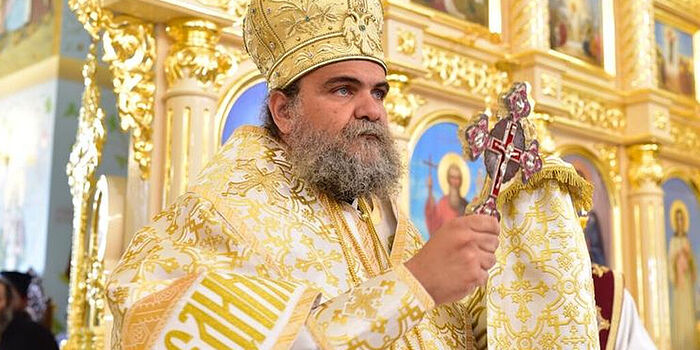
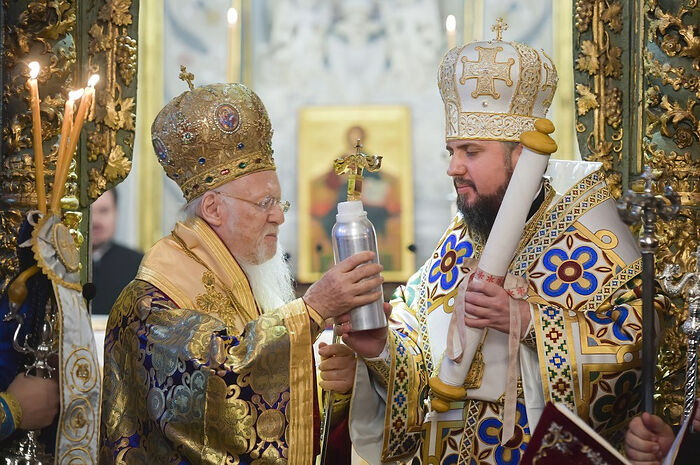
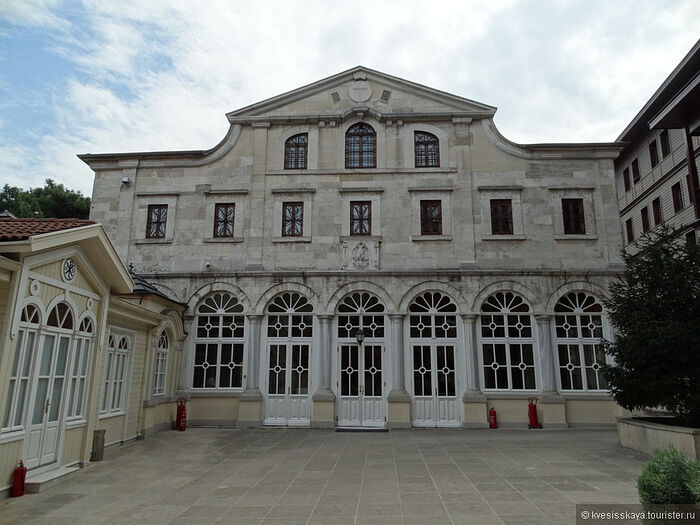
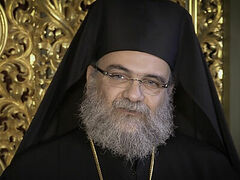
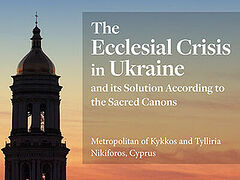
The Russian Church has always affirmed (and still does) that the Ecumenical Patriarch is "first among equals" and holds the place in the dyptychs.
Numerous statements and articles written by Russian priests and theologians and statements from ROCOR on the Ukrainian schism have stated
that the Patriarch of Constantinople is "first among equals". This has NOT been challenged by the Russians.
What is being challenged by the Russians and most of Orthodoxy (including many Greek bishops, priests, theologians, and monastics) is the
idea that Constantinople has the right to dictate to the local Churches what they may do. Constantinople proceeded in Ukraine to restore the
deposed and anathematized Philaret Denisenko and others. Constantinople had absolutely no right to do this or to grant autocephaly to a
schismatic group on the canonical territory of the Russian Church.
To my knowledge, any and all talk of the "Jerusalem model" began only after Patriarch Bartholomew started the Church crisis with Ukraine.
As recently as 2014, the Russian Church was present at the meetings that were convened in preparation for the Council of Crete. At no point
did the Russian challenge Constantinople's position in the dyptychs. Even after the Ukrainian schism, Metropolitan Hilarian Alfayev gave
interviews in which he referred to Constantinople as having the coordinating role in Orthodoxy. The idea that the Russians were trying to
overthrow Constantinople is a paranoid fantasy.
In the aftermath of the Church crisis in which the Orthodox world has watched Patriarch Bartholomew's growing influence over the Greek
speaking Churches there was bound to be talk as to how to deal with Constantinople. The canonical order in Orthodoxy was actually fine
until Patriarch Bartholomew made his move in Ukraine, a move he made with the backing of secular governments.
If Constantinople is going to be challenged in its position as "first among equals" then Patriarch Bartholomew is himself to blame for this along
with Archbishop Elpidophoros and the whole "first without equals" heresy.
Also, keep in mind that Ukraine was not the first time that Constantinople provoked the Russians. Patriarch Bartholomew invaded the Russian
Church's territory in Estonia back in 1995. The Russians let that one go and restored communion with Constantinople in order to keep the
peace. Also, remember that even after the fake "unification council" in Ukraine but before the granting of the fake tomos to Dimenko's group,
Patriarch Kyril of Russia sent Patriarch Bartholomew a letter assuring him that it was not too late to reverse his policies in Ukraine.
Patriarch Bartholomew was given assurances that if he turned back all would be well and was warned that if he continued then things might
eventually have to change.